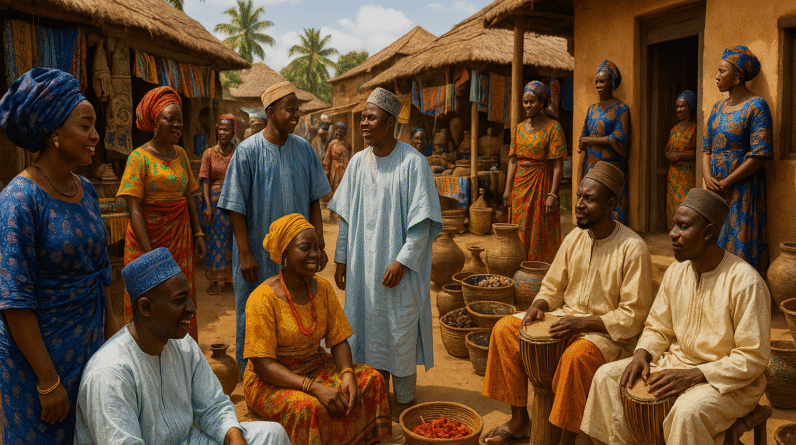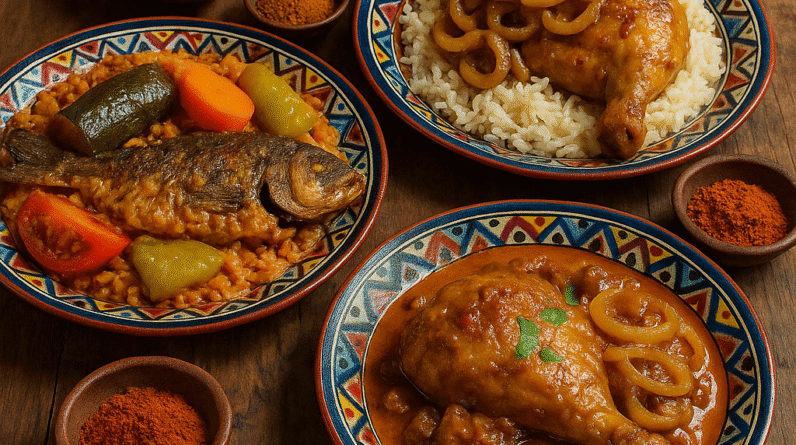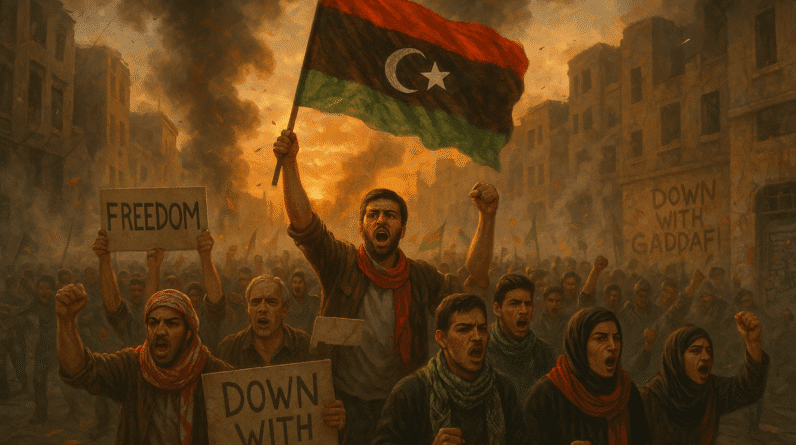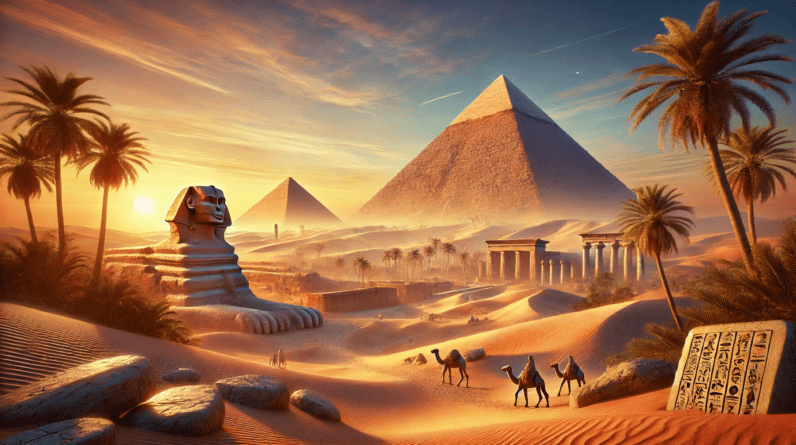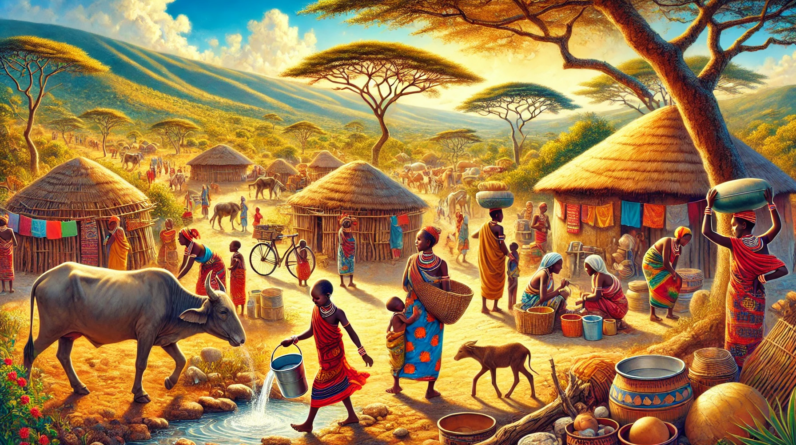
Exploring the Culture of Nigeria
Exploring the Culture of Nigeria. Nigeria, a country with a rich tapestry of diverse cultures, traditions, and languages, offers a fascinating blend of history and modernity. From the bustling streets of Lagos to the serene countryside, Nigeria’s culture is a reflection of its vibrant people. In this article, you will embark on a journey to explore the multifaceted culture of Nigeria, delve into its traditions, customs, music, dance, and cuisine. So, are you ready to immerse yourself in the cultural wonders of Nigeria?
Nigeria: A Melting Pot of Cultures
Nigeria is home to over 250 ethnic groups, each with its unique traditions, languages, and customs. The three largest ethnic groups in Nigeria are the Hausa-Fulani, Yoruba, and Igbo, but there are many others, such as the Ijaw, Kanuri, Tiv, and Edo, each contributing to the cultural vibrancy of the country. This diversity makes Nigeria a fascinating melting pot of cultures, offering a rich tapestry of traditions to explore.
Traditional Nigerian Attire: A Reflection of Cultural Heritage
Traditional attire in Nigeria varies from region to region, with each ethnic group having its distinct styles and designs. The most common traditional outfit for men in Nigeria is the “Agbada,” a flowing robe worn over trousers, often paired with a matching hat. For women, the traditional attire includes the “Buba,” a loose-fitting blouse, paired with the “Iro,” a wrapper, and the “Gele,” a headwrap.
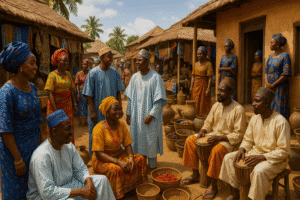
The Art of Nigerian Cuisine: A Gastronomic Delight
Nigerian cuisine is a flavorful blend of spices, herbs, and tropical ingredients that reflects the country’s diverse culinary heritage. Staple foods in Nigerian cuisine include rice, yams, cassava, and plantains, often served with rich stews and soups. Popular Nigerian dishes include Jollof rice, Egusi soup, Suya (grilled meat skewers), and Pounded Yam with Egusi soup. Nigerian cuisine is a true gastronomic delight that will tantalize your taste buds.
Music and Dance: The Heartbeat of Nigeria
Music and dance are integral parts of Nigerian culture, with a vibrant music scene that encompasses a variety of genres, from traditional folk music to modern Afrobeat and hip-hop. Nigerian music is known for its infectious rhythms and catchy melodies, with artists like Fela Kuti, King Sunny Ade, and Burna Boy gaining international acclaim. Traditional Nigerian dances, such as the Yoruba Bata dance and the Igbo Ekpe dance, are a celebration of the country’s cultural roots and traditions.
Festivals and Celebrations: A Tapestry of Color and Tradition
Nigeria is known for its colorful festivals and celebrations that showcase the country’s rich cultural heritage. From the Durbar festival in northern Nigeria to the Osun-Osogbo festival in Osun State, each festival is a vibrant display of music, dance, and traditional rituals. The New Yam Festival, celebrated by the Igbo people, is a time of thanksgiving and feasting to mark the beginning of the harvest season. These festivals offer a unique opportunity to experience the cultural richness of Nigeria firsthand.
Nigerian Literature and Arts: A Beacon of Creativity
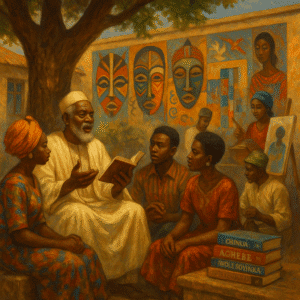
Nigeria has a long and storied literary tradition, with renowned authors such as Chinua Achebe, Wole Soyinka, and Chimamanda Ngozi Adichie gaining international acclaim for their works. Nigerian literature explores themes of tradition, colonialism, identity, and modernity, offering a window into the country’s complex history and society. Nigerian art, including traditional pottery, sculpture, and textiles, reflects the cultural diversity and creativity of the Nigerian people, with artists like Ben Enwonwu and Nike Davies-Okundaye leaving a lasting impact on the global art scene.

This image is property of images.pexels.com.
Nigerian Languages: A Lively Tapestry of Communication
Nigeria is a linguistically diverse country, with over 500 languages spoken across its various regions. The official language of Nigeria is English, inherited from its colonial past, but many Nigerians also speak their native languages. The three major languages in Nigeria are Hausa, Yoruba, and Igbo, each spoken by millions of people. Language is a crucial part of Nigerian culture, reflecting the country’s rich linguistic heritage and diversity.
Traditional Nigerian Weddings: A Celebration of Love and Unity
Traditional Nigerian weddings are vibrant celebrations that bring families and communities together in a joyous union of love and unity. Nigerian weddings are colorful events filled with music, dance, and traditional rituals that vary depending on the ethnic group. The Igbo traditional wedding includes the “Igba Nkwu” ceremony, where the groom officially asks for the bride’s hand in marriage, while the Yoruba traditional wedding features the “Alaga Ijoko,” a woman who acts as the official wedding announcer. These weddings are a celebration of culture, tradition, and the bonds of family and community.
Religion in Nigeria: A Diverse Landscape of Faith
Nigeria is a religiously diverse country, with Christianity and Islam being the two dominant religions practiced by a significant portion of the population. Nigeria is also home to indigenous African religions, such as Yoruba religion and Igbo religion, which have deep roots in the country’s history and traditions. Religious tolerance is an essential aspect of Nigerian culture, with people of different faiths coexisting peacefully and participating in each other’s religious celebrations.
Nigerian Proverbs and Folklore: Wisdom Passed Down Through Generations
Nigerian culture is rich in proverbs, folklore, and oral traditions that have been passed down through generations as a way to impart wisdom, teach morals, and preserve cultural heritage. Proverbs such as “The child who is not embraced by the village will burn it down to feel its warmth” and “The lizard that jumped from the high Iroko tree to the ground said he would praise himself if no one else did” encapsulate the depth of Nigerian wisdom and cultural values. Folklore stories, such as the tales of Anansi the Spider and the Tortoise, are beloved classics that continue to entertain and educate both young and old.
frequently asked questions (FAQs) about the Culture of Nigeria, covering tradition, language, religion, dress, and more:
15 FAQs About the Culture of Nigeria
- What are the main ethnic groups in Nigeria?
Nigeria is home to over 250 ethnic groups, with the three largest being the Hausa-Fulani, Yoruba, and Igbo. - What languages are spoken in Nigeria?
Nigeria has over 500 languages, but the official language is English. Major local languages include Yoruba, Hausa, Igbo, and Pidgin English. - What religions are practiced in Nigeria?
The major religions are Islam (predominant in the North), Christianity (dominant in the South), and traditional African religions in some areas. - What is Nigeria known for culturally?
Nigeria is known for its music, fashion, art, film (Nollywood), oral traditions, and vibrant festivals. - What is traditional Nigerian clothing?
Clothing varies by ethnic group, but common items include agbada, dashiki, gele (headwraps), and ankara fabric. - What is the role of family in Nigerian culture?
Family is highly valued. Extended family often plays a big role, and respect for elders is deeply embedded in social life. - What types of traditional music are popular?
Nigerian music includes Afrobeat, Highlife, Jùjú, Fuji, Apala, and traditional drumming. - Are Nigerian weddings different by culture?
Yes! Each ethnic group has distinct wedding customs — Yoruba, Igbo, and Hausa weddings all have unique clothing, rituals, and music. - What is Nollywood?
Nollywood is Nigeria’s booming film industry — the second-largest in the world by volume, known for storytelling that blends tradition and modern issues. - What are some major festivals in Nigeria?
Notable festivals include the Eyo Festival (Yoruba), Argungu Fishing Festival (Hausa), New Yam Festival (Igbo), and Calabar Carnival. - What is the significance of Nigerian art?
Nigerian art — including bronze casting, wood carving, beadwork, and mask-making — plays key roles in storytelling, rituals, and history. - How important is oral tradition in Nigerian culture?
Extremely important. Griots, folk tales, proverbs, and praise poetry are vital to preserving and passing down cultural heritage. - What foods are central to Nigerian culture?
Popular dishes include jollof rice, egusi soup, suya, pounded yam, ofe nsala, and moi moi — often shared during celebrations. - What are Nigerian values around community and hospitality?
Nigerian culture values community support, generosity, and warm hospitality, especially toward guests and strangers. - Is Nigerian culture modern or traditional?
It’s a blend of both — urban areas embrace modern lifestyles, while rural areas often preserve strong traditional practices.
Would you like this formatted for a webpage, infographic, or printable resource?
Conclusion: Embracing the Cultural Wonders of Nigeria
In conclusion, Nigeria’s culture is a vibrant tapestry of traditions, customs, languages, and beliefs that reflect the country’s rich history and diverse heritage. From traditional attire and cuisine to music, dance, and literature, Nigeria offers a wealth of cultural wonders waiting to be explored. By immersing yourself in the multifaceted culture of Nigeria, you will gain a deeper appreciation for the beauty, resilience, and creativity of its people. So, why not embark on a journey to discover the cultural treasures of Nigeria and experience the magic of this dynamic and diverse country for yourself?


